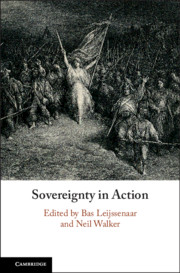2 - When Sovereigns Stir
from Part I - Theory in History
Published online by Cambridge University Press: 07 July 2019
Summary
Richard Tuck’s recent book-length study of Thomas Hobbes’ depiction of the ‘Sleeping Sovereign’ offers an eloquent reminder of the contribution of the great seventeenth-century English philosopher to the political imaginary within which our modern conception of constitutional democracy has emerged. Central to that imaginary is the retention of an evolved conception of sovereignty as the organizing device of political society, and, as one key facet of that evolution, the establishment of a fundamental distinction between sovereignty and government. Hobbes would not be the first to draw such a distinction – that prize belongs to Jean Bodin, writing in the previous century. Yet it was Hobbes who developed this idea in ways that were to alter radically our understanding of the condition of the modern polity, and which still resonate today. As I will argue in this chapter, the theoretical lens and accompanying metaphorical language of Hobbes, suitably extended to cover the stirring of new forms of sovereigntist consciousness and practice, continues to offer a powerful perspective through which we can appreciate both the strengths and the limitations of a sovereignty-centred approach to the contemporary global political condition.
Keywords
- Type
- Chapter
- Information
- Sovereignty in Action , pp. 31 - 64Publisher: Cambridge University PressPrint publication year: 2019



